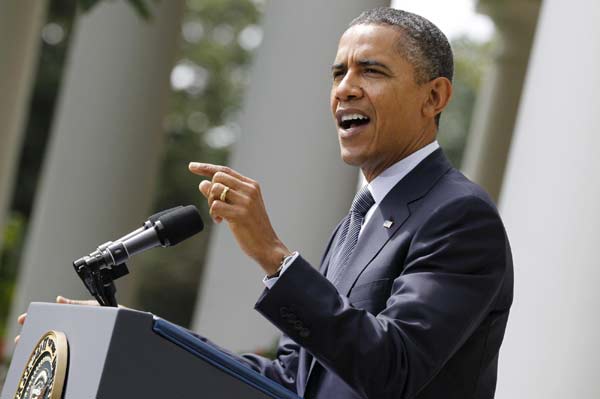| Radiology Room |
| Ultrasound Room |
| Surgery Room |
| Laboratory Room |
| Comprehensive Room |
| Pediatrics Room |
| Dental Room |
| Medical operation instruments |
| Hospital Furniture |
| Medical supplies |
News Center
Obama offers $3 trillion debt plan, tax hikes on rich
 |
|
U.S. President Barack Obama gestures as he talks about cutting the U.S. deficit by raising taxes, from the Rose Garden of the White House in Washington, September 19, 2011. [Photo/Agencies ] |
WASHINGTON - U.S. President Barack Obama laid out a $3.6 trillion plan on Monday to cut U.S. budget deficits partly by raising taxes on the rich, but Republicans rejected it as a political stunt and made clear the proposal has little chance of becoming law.
|
||||
"I will not support any plan that puts all the burden of closing our deficit on ordinary Americans," Obama said. "We are not going to have a one-sided deal that hurts the folks who are most vulnerable."
Obama's speech reflected a more aggressive defense of Democratic principles after he took a battering in two previous budget battles with Republicans this year that helped drive his approval rating to new lows.
Most Americans say they are unhappy with Obama's economic leadership, and the president's re-election hopes could hinge on his ability to convince voters that Republicans represent the rich, not the middle class.
On Monday, he repeatedly said all Americans must pay their "fair share" of taxes, and he sharpened the difference between his vision for America and that of Republicans in a speech meant to regain support among core supporters who have said Obama has failed to stick to liberal principles.
Republicans have consistently opposed any measures resembling tax hikes, saying they will hurt the struggling economy by increasing the burden on job-creating businesses. Republican leaders stuck to that position on Monday, quickly rejecting Obama's plan.
"Veto threats, a massive tax hike, phantom savings, and punting on entitlement reform is not a recipe for economic or job growth," said Republican Senate leader Mitch McConnell.
John Boehner, speaker of the House of Representatives and the top Republican in Congress, said Obama failed to offer a "serious" recommendation to the special bipartisan congressional committee tasked with finding at least $1.2 trillion in savings.
"Pitting one group of Americans against another is not leadership," Boehner said.
Politics, but a plan?
Analysts were skeptical Obama's plan would help America's standing with credit rating agencies such as Standard & Poor's, which last month downgraded U.S. government debt and expressed concern that Washington was too divided to tackle its mountain of debt.
Obama's plan, which will be sent to the "super committee" of six Republicans and six Democrats considering deficit reduction, proposes $3 trillion in savings over 10 years.
These include cuts to Medicare spending aimed mainly at healthcare providers, particularly big drug companies, and some hospital stocks fell sharply on Wall Street on Monday.
But roughly half of overall savings come from higher tax revenues, under the president's proposal.
That would include allowing tax breaks for upper income Americans to expire at the end of 2012, capping popular deductions for things like mortgage interest and charitable donations, and closing corporate tax loopholes.
"This is purely politics, aimed at Obama's demoralized base. It undoubtedly has been poll-tested, so now Obama has a populist campaign issue. There's obviously no chance this could pass" on a vote in Congress, said Greg Valliere, chief political strategist at consultancy Potomac Research Group.
Rudolph Penner, a former director of the Congressional Budget Office, said rating agencies would not be impressed by Obama's failure to recommend deeper healthcare cuts.
"If I were S&P I would not change my rating on the basis of this proposal," he said.
"Buffett rule"
Obama's call to overhaul the U.S. tax code included a "Buffett Rule," named after billionaire investor Warren Buffett, that would set a minimum tax rate for people earning more than $1 million a year.
The tax would only apply to a tiny minority of the millions of Americans who file tax returns, but White House aides said it would set a standard of fairness.
Senior Senate Democrat Charles Schumer said Congress should run with the "Buffett Rule" and urged lawmakers put it into legislation that could be voted upon.
While critics derided Obama's plan as purely political, some analysts saw a sober bid to tackle big fiscal problems.
"Obama's new plan is both a serious legislative proposal and an effort to stake out his ground for his re-election campaign," said Sarah Binder, a senior fellow at The Brookings Institution, although she said Republicans' resistance to tax hikes would likely thwart a compromise.
The super committee must propose a deficit plan by Nov. 23. Congress must then vote on the panel's proposal by Dec. 23 or automatic spending cuts will be triggered across government agencies, beginning in 2013.
Palatable to be left
Obama said his plan, together with savings agreed under an August debt ceiling deal, will cut $4 trillion from the deficit over 10 years, helping deflect Republican claims he is a "tax and spend liberal" that have hurt him with independent voters.
Obama's suggestions do not raise the eligibility age for Medicare recipients, something he proposed during debt ceiling negotiations with Boehner over the summer.
Instead, he is proposing something more palatable to the left wing of his party -- $248 billion in savings from Medicare, the government health program for the elderly. The bulk of that would come from reducing overpayments to health care providers.
Medicare and Medicaid are viewed by analysts as the biggest contributors to long-term U.S. deficits, a driving issue in the election. The U.S. budget deficit in 2011 is expected to be about $1.3 trillion.
本文由廣州佳譽醫(yī)療器械有限公司編輯






